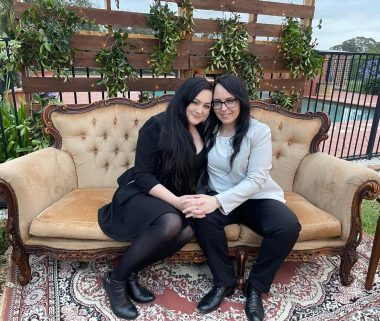The Friendships I’ve Gained While Living With NMO
Written by |

Neuromyelitis optica (NMO) isn’t all bad.
Hear me out.
Sure, the needles, pain, and endless worry about permanent paralysis and vision loss are no fun, but there’s a silver lining if you know where to find it.
At the start of every year, I think about all of the people in my life I’m grateful for, and I realize I’m very blessed.
When I was diagnosed, I turned to the internet. Twelve years ago, there weren’t any Facebook support groups, chat rooms, or Zoom meetups. I was fortunate enough to find a Patient Day hosted by the Guthy-Jackson Charitable Foundation, although I hesitated to travel all the way from Toronto to Los Angeles.
My husband and I eventually decided to attend, and I’m glad we did. I don’t usually get nervous, but the thought of meeting other patients made me uncomfortable. I had no idea what nightmares they might share with me, and I wasn’t yet ready to accept my condition.
Yet it was there that I met my first friends with NMO. We were vastly different but shared many of the same concerns about our futures. Between the medications, the doctor appointments, and the occasional ER visits, there’s nothing “normal” about NMO. But the friends I made that day, and everyone else on this journey, have somehow made it so.
It doesn’t mean we approach each other’s tough days without empathy — quite the opposite. It helps to have friends who truly know what I’m going through, and for whom this life is also normal. This comforts me.
I’ve never met some of my friends who also have NMO. I can’t call them “NMO friends” because they are so much more than that.
About a year ago, I couldn’t sleep one night, as is common for many patients, and I found myself perusing a Facebook support group. That’s how I met my friend Chan, who lives in Australia. Her post reminded me of all the questions, fears, and uncertainty I faced walking into that ballroom on Patient Day so long ago, so I reached out. Chan and I started messaging that night (day for her) and did a video call the following week. Since then, we’ve been each other’s cheerleaders from afar.

Jennifer’s friend Chan, right, with her wife, Jessica. (Courtesy of Chantelle Halloran)
At the time, I was reading Col. Chris Hadfield’s book “An Astronaut’s Guide to Life on Earth.” I realized that like astronauts, NMO patients have a lot to worry about. Our decisions, or lack thereof, can have catastrophic consequences.
The book was inspiring and timely, so I shared it with Chan. Hadfield wrote, “I learned how to neutralize fear, how to stay focused and how to succeed.” So, that’s what we do for each other. We neutralize each other’s fears from afar and remind each other to keep moving forward toward our next goal in life.
I once told my friend that we look up at the same moon, which makes the distance between us feel a little shorter. We started calling each other “astronaut” when we check in.
Chan probably doesn’t know it, but she inspires me. The way she moves forward in her life and takes action to surround herself with positive people and energy is truly incredible. One day, astronaut, we’ll look up at the moon together.
Last year, I joined The Sumaira Foundation (TSF) as a patient ambassador, and was then promoted to executive director of TSF Canada. Working with the ambassadors, the board, and the organization’s partners has been unexpectedly rewarding because of the friendships I’ve made. I can laugh with them about needing to use the bathroom multiple times a night, and feel accepted when I need a mid-morning nap. And yes, I said mid-morning, although I suspect it has something to do with my disease-induced insomnia.
When I’m laughing at our potty emergency stories, or exchanging memes with someone across the world, it’s hard to remember the pain, fear, and worry that accompany the disorder. But that’s what friends are for — especially those who just happen to have NMO, too.
***
Note: Neuromyelitis News is strictly a news and information website about the disease. It does not provide medical advice, diagnosis, or treatment. This content is not intended to be a substitute for professional medical advice, diagnosis, or treatment. Always seek the advice of your physician or other qualified health providers with any questions you may have regarding a medical condition. Never disregard professional medical advice or delay in seeking it because of something you have read on this website. The opinions expressed in this column are not those of Neuromyelitis News, or its parent company, Bionews, and are intended to spark discussion about issues pertaining to neuromyelitis optica spectrum disorder (NMOSD).







Leave a comment
Fill in the required fields to post. Your email address will not be published.